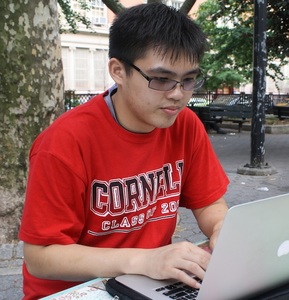by Calvin Ng
I start the day with country, say "Won't Back Down." Then I move onto rock, "Charlie Brown." Yet, I can't finish my 45 minute commute to school without hip hop. "The Other Side" is often the lift I need for the day. My versatility does not end with my iPod -- it trickles into my academic life from history to math. I am drawn to Cornell's College of Arts and Science for the opportunity to explore my diverse academic interests.
When I think of math and history, I can't escape an engagement of Greek and Roman culture. The two civilizations had similar gods, similar governments and similar architecture that reflects the evolution of mathematics in many ways. Yet, the two are so different, and I questioned how the Romans could have become tyrannical and made so many poor decisions. It was as if they had not learned from the Greeks at all.
At Cornell, I picture myself sitting in classes such as Cultures of the Middle Ages: Medieval Frontiers Societies or The United States in the 1960s and 1970s. Since the scope of these courses is small, relative to World History or U.S. History, I'll be able to learn more of the smaller details within the periods. The in-depth background information, which Professors Oren Falk and Kohler-Hausmann will provide, will change the way I think about these eras.
At Stuyvesant, I have taken the most advanced math courses available. Each semester, as I took a new course, I wondered how topics such as integrals or derivatives could apply to real-life situations. I knew that all small businesses used basic math for buying, selling and pricing products or services; most jobs need some type of math. My father always mentioned how finance and math were heavily linked, especially statistics and calculus. The fact that there are numerous ways to find the same solution to a problem fascinates me. I wondered how companies choose methods to achieve their goals. Does everyone in a company approach their equations in the same way, or is there room for creativity at that high level?
My unyielding interest in mathematics paired with my newfound interest for history, taking me through different avenues of cultures, lifestyles and religions, but they seemed so unrelated. During senior year, I realized that economics was the perfect discipline to combine both my interests of history and mathematics. On the first day of Macroeconomics, my teacher gave a lecture comparing and contrasting the Great Depression and the Great Recession of 2008. As she talked more about the economic circumstances and actions taken during the Depression, I began to think about what economists in 2008 had suggested to do about the recession. How much did economists learn from the Depression and how did they apply it? That first day of economics showed me an application of history in a modern day scenario. As the course progressed, my teacher warned the class of complicated calculations, but that didn't matter to me. I had found an application of mathematics that would tie into my interest in history.
Cornell's College of Arts and Science will be the perfect environment for me to further my studies in economics. Being personally affected by the Great Recession, I want to help companies and banks make decisions that are less likely to negatively impact the country. Cornell's extensive range of economics courses can provide me with what I need to gain a broader understanding of the discipline, with courses that are specified to tackle different economic fields as they relate to various historical contexts. Cornell will provide me with numerous challenges to further my studies in courses like Topics in 20th Century Economics History, International Finance and Macroeconomics. I am drawn to Cornell for the prime opportunities it offers to further my exploration of math, economics, history and other disciplines.
Calvin Ng, a graduate of Stuyvesant High School, is a freshman at Cornell University.
